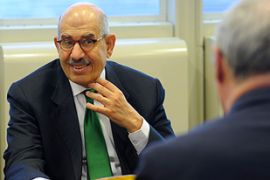IAEA approves India nuclear pact
UN agency’s go-ahead is vital for US-India civilian nuclear deal to be finalised.

“These are not comprehensive or full-scope safeguards [unlike with Nuclear Non-Proliferation Treaty (NPT) member states] … [But] it satisfies India’s needs while maintaining all the agency’s legal requirements,” he said.
“As with other safeguards agreements between the agency and member states, the agreement is of indefinite duration. There are no conditions for discontinuation … other than those provided by the safeguards agreement itself.”
James Acton, a nuclear expert, told Al Jazeera: “It is very, very significant from a proliferation perspective … it is also very important from the perspective of US-Indian relations. They are getting into a strategic relationship.”
Pre-condition
Approval from the IAEA was a pre-condition for the India-US nuclear deal to take effect so that a system of extended checks can follow.
The pact to share civilian technology was first unveiled in 2005 by George Bush, the US president, and Manmohan Singh, the Indian prime minister, to help India enter the global commercial nuclear fold after being shut out for decades.
A total 14 of India’s 22 reactors, six of which are already subject to other IAEA safeguards agreements, are expected to come under the agency’s inspection norms by 2014 – the first ones as early as 2009.
‘Not an answer’
Washington says the deal ushers India towards the non-proliferation mainstream and fights global warming by promoting the use of low-polluting nuclear energy in surging developing economies and reducing the use of oil and gas.
However, Todd Baer, Al Jazeera’s correspondent in India, said some experts say the deal is not the answer to solving India’s power crisis.
“In fact, they say it will create more problems for this country on the global stage,” Baer said.
Depsite this, Singh believes a nuclear deal with the US is part of the answer to his country’s energy needs.
“This decision was taken with the fullest confidence that we are doing so in the best interest of our people and our country,” Singh said.
Nuclear fuel
The decision to provide access to US nuclear fuel and technology to a country that has not signed the NPT and has developed atomic bombs in secret, conducting its first nuclear test in 1974, has concerned some analysts.
Before it can sign the deal with the US, India also needs a waiver from the Nuclear Suppliers Group (NSG), a group of 45 states exporting nuclear fuel and technology, whose rules ban trade with non-NPT countries.
The deal can then go to the US congress where it must still be ratified.
The NSG is not expected to discuss exempting India from its rules until September, which could push ratification back to January 2009.